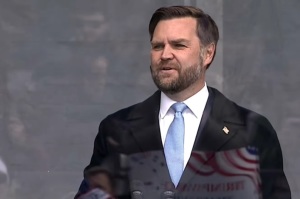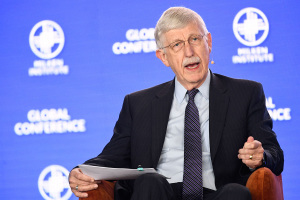Critics of Buffett's 'Tax the Rich' Plan Suggest He Give to IRS
Billionaire investor Warren Buffett argued in a New York Times opinion piece on Monday that the federal government should tax the wealthy more to reduce budget deficits. His argument has been widely cited by liberals, but conservatives and libertarians have pointed to factual errors in his writing.
In the editorial, Buffett said that as a billionaire, he pays a lower tax rate than his middle income employees: “What I paid was only 17.4 percent of my taxable income-and that’s actually a lower percentage than was paid by any of the other 20 people in our office. Their tax burdens ranged from 33 percent to 41 percent and averaged 36 percent.”
“The mega-rich pay income taxes at a rate of 15 percent on most of their earnings but pay practically nothing in payroll taxes. It’s a different story for the middle class: typically, they fall into the 15 percent and 25 percent income tax brackets, and then are hit with heavy payroll taxes to boot,” Buffett added.
Buffett says in order to raise revenue to reduce budget deficits, Congress should leave the current tax rates in place (which would mean making the Bush tax cuts, set to expire in 2013, permanent), and continue the reduction in the payroll tax paid by employees (which was initially part of the stimulus bill and is set to expire in 2012).
Buffett also suggests adding two additional tax rates: “for those making more than $1 million - there were 236,883 such households in 2009. I would raise rates immediately on taxable income in excess of $1 million, including, of course, dividends and capital gains. And for those who make $10 million or more – there were 8,274 in 2009 – I would suggest an additional increase in rate.”
Several conservatives and libertarians have pointed out, however, that Buffett left out a crucial piece of information regarding how much he pays in taxes –corporate taxes. His company, Berkshire Hathaway, like all corporations in the United States, pays a 35 percent tax rate on its profits. As the primary owner of Berkshire Hathaway, Buffett would have paid a large share of those taxes.
Many of the wealthy pay taxes on dividends, money companies’ pay to shareholders, and capital gains, money made on the sale of investments. Since dividends are currently taxed at 15 percent, this may be what Buffett was referring to when he said the “mega-rich” pay a 15 percent rate. (Berkshire Hathaway does not pay dividends, but Buffett likely has other investments that do.)
The taxes on dividends and capital gains are, however, a form of double taxation. Some nations choose to tax corporations when they make a profit through corporate taxes. Other nations choose to tax corporate profits when they are paid out in dividends. The United States in unique in that it does both.
Tim Worstall, a fellow at the Adam Smith Institute in London, points this out in an article for Forbes.com critiquing Buffett's claims. When Buffett, or wealthy Americans, pay 15 percent on dividend income, this is on income that has already been taxed at 35 percent.
“The real tax rate on corporate income paid to individuals through capital gains and dividends is not 15%. It is closer to 45% once you count the tax on corporate profits. If the dividend tax rises to 20% next year from 15% today, then the total tax on dividends paid to shareholders would be closer to 50%, and that doesn't include state and local taxes,” Stephen Moore wrote in a July 28 editorial for the Wall Street Journal.
Libertarian economist Dan Mitchell also points out Buffett's failure to account for corporate taxes and points to another omission – the inheritance tax, also known as the estate tax or death tax. The inheritance tax is paid by the wealthy on assets willed to others upon their death. “Buffett completely ignores the impact of the death tax, which will result in the federal government seizing 45 percent of his assets,” Mitchell writes.
Liberals have been praising Buffett's argument, and President Obama has been mentioning it in his stump speeches on his 3-day tour through the Midwest. As Mitchell points out, though, there are some inconsistencies in Buffett's argument and typical liberal thinking on payroll taxes.
Buffett points out that one of the reasons that the middle class pay a higher portion of their income in federal taxes is because the payroll tax is capped for Social Security (no taxes are paid after the first $106,800 made in 2011). The cap, therefore, could be removed and the wealthy would pay more in taxes.
Democrats, however, mostly support the cap because it keeps the program more like an “earned benefit” program rather than a wealth transfer program. Americans pay into the system for current retirees as they work so that they can take out of the system when they retire, and future workers will pay into the system for them. If the cap were removed, the wealthy would pay much more into the system than they would get as benefits when they retire. (There is already some wealth transfer from rich to poor in the current system, but that tendency would be exacerbated if the cap were lifted.)
Lifting the cap, therefore, would essentially make Social Security into something more like a welfare program. Social Security has broad appeal now because it is a system that everyone, not just the poor, participates in. Since Democrats have been reluctant to alter the system in a way that would diminish support for the system, they have been reluctant to lift the cap on the Social Security payroll tax.
Democrats are praising Buffett's condemnation of a system they created and have continued to support.
Many of Buffett's critics have also pointed out that if the rich and mega-rich want to help reduce the deficit, they do not need to wait for Congress to pass a law and the president to sign it. All they have to do is write a check and send it to the Treasury Department.
As Worstall points out, the check should be sent to, Gifts to the United States, U.S. Department of the Treasury, Credit Accounting Branch, 3700 East-West Highway, Room 6D37, Hyattsville, MD 20782.



























